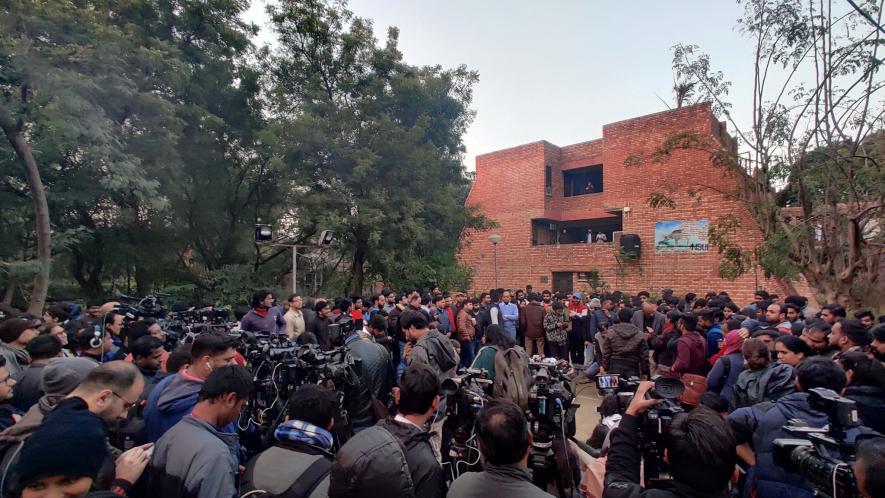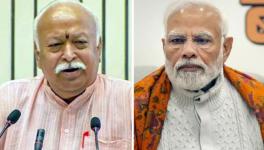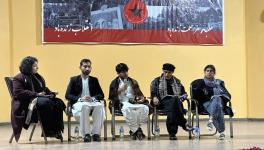Why we Want JNU’s VC to Resign

For the past few years the perpetrators of violence in JNU have worn masks of the same colour: saffron. That is the colour of the mask of protection offered to them by JNU’s Vice Chancellor, Mamidala Jagadesh Kumar, the saviour of the Sangh parivar which controls the state and the police.
Those who attacked Najeeb Ahmed on 14 October 2016 in JNU, which led to his disappearance, were not wearing masks. Yet, the day after Najeeb disappeared, the ABVP goons who stood accused of attacking him were freely roaming the campus. They had the protection of the VC. Neither the police nor university authorities took any serious measure against those who attacked Najeeb. To fool the student community, a few of them were made to shift hostel rooms. The ‘action’ against them ended there. A VC is supposed to protect the student community but JNU’s Jagadesh Kumar extended all his support to the assailants of his student. Despite numerous witnesses, he protected the ABVP goons who attacked Najeeb.
The Delhi police, which is directly controlled by the Union Home Ministry, physically dragged Najeeb’s mother, Fatima Nafees, who was desperately searching for her son, and brutally attacked students who were supporting her. The CBI failed to find Najeeb and filed a closure report giving his attackers a clean chit. Now we are witnessing more and more violence against JNU students by RSS goons who come wearing masks every time.
What happened in JNU on Sunday was a preplanned attack by ABVP activists facilitated by the university administration and Delhi police: the same authorities who made Najeeb disappear. Mamidala Jagadesh Kumar makes the doves of peace flutter on twitter but he has to answer why the ABVP assailants confidently said “apna VC hai”—the VC is ours.
Even during the 2018 student union election, to hide their embarrassment over losing, ABVP goons had turned violent on campus. All these incidents took place in the presence of security guards, who have repeatedly demonstrated, by their silence and neglect of security, how loyal they are to the VC. There are video clips of the event that unfolded during the 2018 elections but the VC took no action. Unheard-of “disciplinary” actions are routinely taken against students, who are also berated on Twitter by the VC for “damaging public property”.
If someone even writes murdabad on a wall they are penalised for it, unless they are ABVP criminals smashing the counting centres at the School of International Studies, as they did during last year’s election. Two years ago, the building housing the office of the dean of students was ravaged by the ABVP during a protest. No disciplinary action was taken. Instead, the VC protected them by building a wall of silence around them.
On 4 January 2020 students sleeping near the administrative block were attacked by ABVP men. Similarly, the protest against the fee hike was supported by students. The examinations and the registrations for the present semester were boycotted by a vast majority of students. This threw the administration into a crisis. It is the ABVP who came to the rescue. They sought to counter the agitation against the fees hike with violence. Still the VC did not budge. He sat mute as the university’s doors were opened, letting the attackers enter the campus.
One of the present authors, who has been a research student at JNU for the past six years, was prevented from entering the campus despite holding an identity card after Sunday’s events. Yet, armed right wing forces, many of them not even students of JNU, could enter the campus with iron rods, swords and axes and attacked students in the dark. There is evidence of the VC’s puppets, disguised as teachers, getting involved in the conspiracy. After all these incidents, all the VC does is tweet that ‘there should be peace in campus’.
Silent Spectators
JNU is in a high-security area with two police stations within one kilometre's distance. The CRPF commandant’s office is right in front of the campus. The administrative centres of many central government departments, such as the Central Information Commission’s office, are around the corner from it. Thousands of police and other security personnel were deployed inside and outside the campus on Sunday, the day of the attack. Two months ago, a new security agency, led by retired members of the central security forces, were assigned to the campus replacing the earlier agency. Yet, all stood silent, watching the violence. The JNU administration and Delhi Police should be held responsible for this.
What are the Incentives for Violence?
Golden opportunities await those who join ABVP, support the Sangh parivar government and the JNU administration. The condition is that the administration’s anti-student policies must be supported and students and teachers who demand action on just causes must be attacked. Not only will those who follow these steps escape legal or disciplinary action, they will also get various government sinecures in central and state universities that have fallen under the influence of the Sangh—whether or not you have the required professional expertise does not matter.
Accordingly, last month, the JNU administration granted full support to the ABVP by appointing ABVP leader Sourabh Sharma, a former JNUSU joint secretary, as assistant professor in the School of Computer and Systems Sciences in an illegitimate manner. Appointments were also made to different JNU centres solely on the basis of the candidates’ association with the ABVP. Even some staunch supporters of the ABVP spoke about the nepotism of the JNU Vice Chancellor.
In this culture of impunity he has fostered, it is no wonder that the same goons disguised themselves as teachers and carried out violence in the campus along with ABVP people. What we have seen is the loyalists of the Sangh parivar execute their agenda.
Enemies of Public Education
Throughout history the ruling classes have made education a privilege available only to the rich. Nowadays, the Sangh parivar is doing the same. Not only the current issue of fee hike, other recent ‘reforms’ implemented in JNU have also strategically excluded students from marginalised communities.
The university’s changing social and economic composition is alarming. The current fees hike should be seen as part of the same agenda of excluding the marginalised from higher education. For three months JNU students have been protesting against the commercialisation of education. Free and universal education is absolutely essential if a country is to progress.
We say to those who call JNU “home to anti-nationals”—any move against public education is against our country.
In summation, it is evident that Sunday’s violence was orchestrated by a nexus of right wing administration, faculty and the ABVP. The massive and historic protest against the fees hike, which a majority of students rallied for, was a slap on the face of the administration and its allies who wanted to execute their agenda of privatisation.
The VC was never prepared to hold talks with the students. Instead, he exaggerated every issue without ever finding solutions. He has proved himself unworthy of his post. Now the struggle against privatisation of education is spreading across the country. However, the hyper-masculine ego of the right wing still prevents them from holding talks to resolve student’s issues. The mere thought of surrendering to a struggle led by a woman, JNUSU president Aishe Ghosh would also be anathema to the Sangh. That is precisely why the armed attackers sought to attack her as viciously as they did.
JNU’s Vice Chancellor has tarnished his position by defending the ABVP’s violence ever since he took charge of the university. The VC must go.
The authors are former JNU students. The views are personal.
Get the latest reports & analysis with people's perspective on Protests, movements & deep analytical videos, discussions of the current affairs in your Telegram app. Subscribe to NewsClick's Telegram channel & get Real-Time updates on stories, as they get published on our website.
























